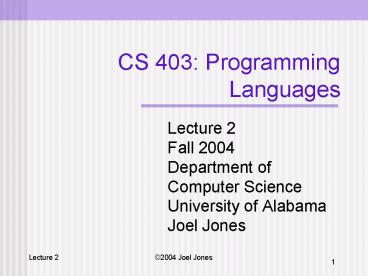CS 403: Programming Languages - PowerPoint PPT Presentation
1 / 17
Title:
CS 403: Programming Languages
Description:
Variables identified as const in C can be a function of non constants and ... Programmers can mange memory themselves with explicit allocation/deallocations. ... – PowerPoint PPT presentation
Number of Views:18
Avg rating:3.0/5.0
Title: CS 403: Programming Languages
1
CS 403 Programming Languages
- Lecture 2
- Fall 2004
- Department of Computer Science
- University of Alabama
- Joel Jones
2
Outline
- Reading Questions from Last Class
- Binding Time
- Objects Lifetime
- Storage Management
- Announcements
- Reading Questions for Next Class
3
Objects lifetime
- Key events in the life of an object
4
Storage Management
- Three storage allocation mechanisms
- Static
- Stack
- Heap
5
Static Allocation
- Global variables
- Constants
- manifest, declared (parameter variables in
Fortran) or identified by the compiler - Variables identified as const in C can be a
function of non constants and therefore cannot be
statically allocated. - Constant tables generated by the compiler for
debugging and other purposes.
6
Static Allocation (Cont.)
- In the absence of recursion, all variables can be
statically allocated. - Also, can be statically allocated
- Arguments and return values (or their addresses).
Allocation can be in processor registers rather
than in memory - Temporaries
- Bookkeeping information
- return address
- saved registers,
- debugging information
7
Static Allocation (Cont.)
8
Stack-based Allocation (Cont.)
- Needed when language permits recursion
- It could be useful in languages without recursion
because it could save space. - Each subroutine invocation creates a frame or
activation record - arguments
- return address
- local variables
- temporaries
- bookkeeping information
- Stack maintained by
- calling sequence
- prologue
- epilogue
9
Stack-based Allocation (Cont.)
10
Heap-based Allocation
- Region of storage in which blocks of memory can
be allocated and deallocated at arbitrary times. - Because they are not allocated in the stack, the
lifetime of objects allocated in the heap is not
confined to the subroutine where they are
created. - They can be assigned to parameters (or to
components of objects accessed via pointers by
parameters) - They can be returned as value of the
subroutine/function/method.
11
Example Heap and Stack Layout
class C int i C p public
C(int j, C q) i j p q void F(int k,
C s) if (k 0) return C t new
C(k, s) F(k - 1, t) int main ()
F(2, NULL) return 0
12
Heap-based Allocation (Cont.)
- There are several strategies to manage space in
the heap. - An important issue is fragmentation (also an
issue in virtual memory management systems) - Internal fragmentation when space allocated is
larger than needed. - External fragmentation when allocated blocks are
scattered through the heap. It could be that the
total space available could is more than
requested, but no block has the needed size.
13
Heap-based Allocation (Cont.)
- One approach to maintain the free memory space is
to use a free list. - Two strategies to find a block for a give request
- First fit. Use the first block in the list that
is large enough to satisfy the request - Best fit. Search the entire list to find the
smallest block that satisfy the request - The free list could be organized (conceptually)
as an array of free lists where each list in the
array contain blocks of the same size. - Buddy system
- Fibonacci heap (better internal fragmentation)
14
Garbage collection
- Programmers can mange memory themselves with
explicit allocation/deallocations. - However, garbage collection can be applied
automatically by the run-time system to avoid
memory leaks and difficult to find dangling
references. - Lisp
- Java
- The disadvantage is cost.
15
Announcements
- ACM initial meeting of the year. Wednesday,
September 1st, 600pm, Houser 108.
16
(No Transcript)
17
Reading Questions for Next Class
- Answer the following question
- How many different scopes does C have?































